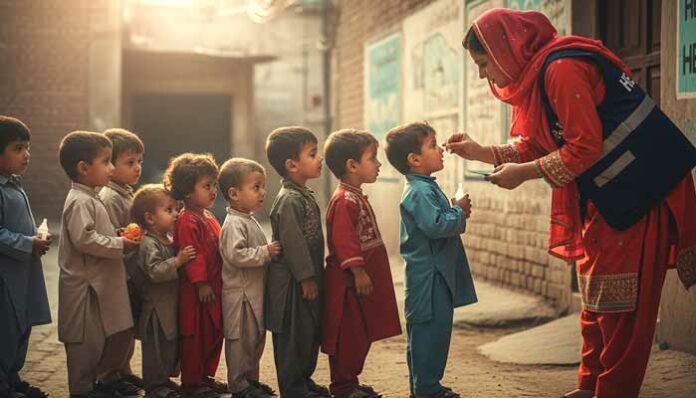More Worry as Poliovirus Signs Appear in Important Places
Recent checks by health officials have raised concern as traces of the virus were found in the surroundings of several areas, including Gwadar, Quetta, South Waziristan, Rawalpindi, Larkana, and Mirpurkhas. Authorities are now closely watching the situation to prevent further spread. Officials are on alert due to the emergence of poliovirus signs in these Areas.
Health authorities have raised concern after finding signs of the polio virus in sewage water from seven Areas. Karachi is one of the areas being closely watched, as efforts are now being stepped up to stop the virus from spreading further. The detection of poliovirus signs has intensified monitoring efforts in Karachi.
New testing has shown that the polio virus is still present in some parts of Pakistan. It was found in samples from Gwadar, Quetta, Upper and Lower South Waziristan, Rawalpindi, Larkana, and Mirpurkhas. Authorities are urging people to stay alert and make sure all children are vaccinated. The presence of poliovirus signs in these samples highlights the ongoing threat.
As part of ongoing efforts to track polio, teams visited nine different areas in Pakistan between May 8 and May 23. They took one water sample from each place to test for the virus. The results will help guide future steps in keeping the environment safe from polio. These tests are crucial in identifying early poliovirus signs in the environment.
Concerns are increasing as more families in Karachi are avoiding polio vaccines for their children. On June 16, officials shared that during May, more than 37,000 parents said no to the polio drops. Health teams are now working on ways to rebuild trust and encourage vaccination. Vaccine refusal in high-risk areas can worsen the impact of poliovirus signs.
Saying No to Vaccines Makes It Harder to Stop Poliovirus Signs
Vaccine refusal is becoming a bigger issue in the port city. More and more parents are not allowing their children to get the polio drops, causing the number of refusal cases to rise. Health workers say more awareness is needed to change minds and protect children. Communities showing poliovirus signs need stronger awareness campaigns.
The rising number of vaccine refusals has become a serious concern. In April, nearly 37,360 families decided not to give polio drops to their children, according to the polio campaign team. Efforts are now being made to reach these families and help them understand the importance of vaccination. This trend is especially worrying in locations already showing poliovirus signs.
Convincing every parent to agree to polio drops is still a struggle, the center explained. Many continue to say no, which slows down the progress. To protect all children and stop polio forever, full support from families is still needed.
Extra efforts are now focused on places where polio could easily spread. One big reason parents refuse the vaccine is because they don’t fully understand it or have wrong beliefs about it.
In many places, a dangerous virus still puts young children at risk. It spreads fast and mostly affects kids under five, damaging their nerves and sometimes causing lifelong disability or death. There is no treatment to cure this illness, but giving children the right vaccine can protect them. Ending this disease depends on strong awareness and full support from families.
Despite years of hard work, some countries are still fighting to stop the virus completely. Pakistan, along with Afghanistan, remains one of the last places where this disease continues to spread. After a steady drop in cases over time, the country is now seeing a rise in new infections. Stronger efforts and public support are needed to protect every child and finally end this threat.
The fight against the virus continues across the country. So far this year, 12 children in Pakistan have been affected. Khyber Pakhtunkhwa has reported 6 cases, Sindh 4, and Punjab and Gilgit-Baltistan have had 1 case each. The most recent case was confirmed in Bannu, KP, this past Friday. Health teams are working hard to stop the spread and protect more children.
Stopping the spread of the virus needs equal efforts everywhere. While many areas are seeing success, parts of southern KP are still hard to reach. Health teams face problems getting to homes, which means some kids are left out and remain unprotected. Reaching every child is key to winning this fight.
This year, Pakistan carried out three major polio drives, one each in February, April, and May. These drives helped reach more than 45 million children with polio drops. Nearly 400,000 workers joined the effort, including 225,000 women who gave the vaccines. The National Institutes of Health in Islamabad shared this report through its Polio Lab.
The journey to protect every child in Pakistan continues. Just a month ago, Pakistan began its third big effort this year to give vaccines to children all over the country. This campaign is part of a larger mission to wipe out the virus and make sure no child is harmed by it again. Step by step, the country moves closer to a safer, healthier future. With sustained efforts, the goal is to eliminate poliovirus signs once and for all.
For authentic news and the latest updates, stay connected with: DumdaarPoint.com

